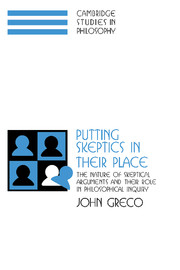 Putting Skeptics in their Place
Putting Skeptics in their Place Book contents
- Frontmatter
- Contents
- Preface
- 1 The Nature of Skeptical Arguments and Their Role in Philosophical Inquiry
- 2 Skepticism about the World: Part One – Reconstructions
- 3 Skepticism about the World: Part Two – Dismissive Responses
- 4 Skepticism about the World: Part Three – Dualism, Realism, and Representationalism
- 5 The Argument from an Infinite Regress of Reasons
- 6 Hume's Skepticism about Unobserved Matters of Fact
- 7 Agent Reliabilism
- 8 Agent Reliabilism and the Relevant Sense of “Relevant Possibility”
- 9 Moral and Religious Epistemology
- Bibliography
- Index
6 - Hume's Skepticism about Unobserved Matters of Fact
Published online by Cambridge University Press: 03 November 2009
- Frontmatter
- Contents
- Preface
- 1 The Nature of Skeptical Arguments and Their Role in Philosophical Inquiry
- 2 Skepticism about the World: Part One – Reconstructions
- 3 Skepticism about the World: Part Two – Dismissive Responses
- 4 Skepticism about the World: Part Three – Dualism, Realism, and Representationalism
- 5 The Argument from an Infinite Regress of Reasons
- 6 Hume's Skepticism about Unobserved Matters of Fact
- 7 Agent Reliabilism
- 8 Agent Reliabilism and the Relevant Sense of “Relevant Possibility”
- 9 Moral and Religious Epistemology
- Bibliography
- Index
Summary
In the preceding chapters we have considered arguments for skepticism about the world from Descartes and Hume. We also looked at the Pyrrhonian infinite regress argument, which is universal in its scope. A third kind of skepticism regards our knowledge of unobserved matters of fact. Arguments for this position have their most famous articulation in Hume and charge that we can never make adequate inferences from the observed to the unobserved. Skeptical arguments of this kind have sometimes been called “the problem of induction.”
Various objections have been raised against Hume's reasoning here. The three that I will be concerned with are (a) that Hume's arguments depend on his empiricist theory of ideas, (b) that the arguments assume that absolute certainty is required for knowledge, and (c) that Hume's arguments assume deductivism, or the position that inductive reasoning cannot give rise to knowledge.
If any of these objections were effective, then Hume's skeptical arguments would teach no important lesson. No one today thinks that Hume's theory of ideas is adequate, or that knowledge requires either absolute certainty or deduction. But in fact none of these objections is effective against Hume's skeptical reasoning. This is because Hume's reasoning does not essentially depend on the various implausible assumptions that the objections attribute to it. As we have seen in other cases, the skeptical reasoning in question can be reconstructed so as to employ only assumptions that are pre-theoretically plausible, and that would be accepted by nearly anyone outside the context of philosophical inquiry.
- Type
- Chapter
- Information
- Putting Skeptics in their PlaceThe Nature of Skeptical Arguments and their Role in Philosophical Inquiry, pp. 137 - 163Publisher: Cambridge University PressPrint publication year: 2000


